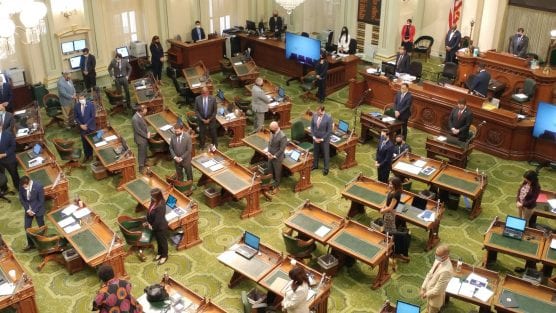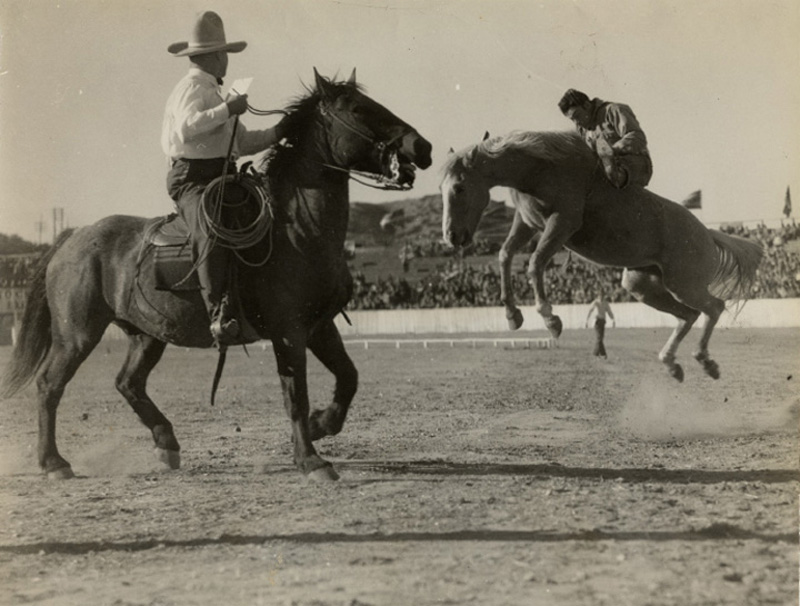SACRAMENTO — Desperate to patch a COVID-19-sized budget hole, the California Legislature is warming to the once-taboo subject of sports betting and has begun handicapping its potential tax windfall.
After two years of watching silently as other states hurriedly legalized sports wagering, a Senate committee on Tuesday advanced legislation that could bring sportsbooks — and hundreds of millions in new tax revenue — to the Golden State.
“We have a duty to bring illegal sports wagering out of the shadows and support our communities with the revenue,” said state Sen. Bill Dodd. “We can’t afford inaction.”
The fact gambling legislation was included in Tuesday’s Senate Governmental Committee agenda reflects the frantic budget negotiations ongoing at the state Capitol, as in recent years lawmakers wouldn’t even give the issue a hearing, let alone a vote. But facing an estimated $54 billion deficit and a budget due in less than two weeks, the landscape has shifted with opportunistic lawmakers now touting legalization as a surefire win for the state’s coffers.
Taking the first step toward legalization, Democrats on the committee advanced the measure in a partisan 9-3 vote.
Under the proposal by Dodd, D-Napa, and Assemblyman Adam Gray, D-Merced, California tribal casinos and the state’s largest racetracks would be allowed to open sportsbooks as well as offer online wagering. Casinos would also be permitted to offer dice and roulette games and the proposal would affirm private cardrooms’ ability to offer games like blackjack and Texas hold ‘em poker.
In exchange, the state would tax in-house wagers at 10%, and 15% for online and mobile bets. Supporters say legalized sports gambling could generate $200 million in new revenue in the first year with the potential for $500 million or more in additional years as more sportsbooks go live.
California is by far the biggest chip of the 28 states that have yet to legalize sports betting. Californians place an estimated $10 billion or more annually in illegal wagers.
Tuesday’s result is a good start for the proponents, but their legalization effort still faces lofty odds.
The proposal will require two-thirds approval in both chambers and then needs to be approved by a majority of statewide voters in November. Along with the legislative hurdles, the state’s influential tribal casinos — which have helped squash debate on the topic for years — are uniting against the constitutional amendment.
A group of Indian tribes were pushing their own legalization ballot measure but their signature-gathering efforts were undone by the coronavirus pandemic. Their proposal didn’t call for mobile wagering and of course didn’t involve private cardrooms.
The tribes testified mobile wagering carries a list of regulatory hurdles and disputed the presumed budget boost.
“Online sports wagering raises many regulatory challenges including how to identify and prevent minors from gambling, how to identify and assist problem gamblers and how to effectively police against unauthorized and suspicious transactions,” said Jeff Grubbe, chair of the Agua Caliente Band of Cahuilla Indians.
Grubbe said the pandemic greatly reduced the average gambler’s disposable income and predicted “tax revenue generated from these measures will have no meaningful impact on the massive budget deficit.”
No tribal representatives testified or called in to support Senate Constitutional Amendment 6.

Sports betting is legal in the green states and not in the red states as of December 1, 2019. | Photo: Terrorist96/Creative Commons Attribution-Share Alike 4.0.
California’s renewed debate comes two years after the U.S. Supreme Court struck down a federal ban on sports gambling in most states and cleared the way for states to break into Nevada’s longstanding stranglehold over the lucrative industry.
Dodd and Gray have already courted a deep bench of supporters, including the country’s major sports leagues, the PGA Tour, daily fantasy giants DraftKings and FanDuel as well as a host of California law enforcement groups.
The co-authors, who convened an oversight hearing with industry experts earlier this year, acknowledged the bill is a work in progress and that negotiations with the Indian casinos would continue. In the meantime, Gray encouraged the senators to keep an open mind and reminded them illegal sports gambling has persisted in their individual districts for decades and would continue to do so.
“There’s going to be a lot of lobbying around this bill, a lot of misguided comments and accusations,” Gray said. “Let’s take every step we can members to ensure we don’t have to make [budget] cuts.”
As written, the proposal would funnel revenue generated from sports gambling into a general fund and be available to “assist the state in recovering from the health and economic damage caused by the Covid-19 pandemic and to fund priorities related to education, public health and public safety.”
Operators would also be required to remit 1% or less of their gross sports wagering revenue to fight problem gambling, while those opening online offerings would pay a one-time $5 million fee and an ongoing annual $1 million charge.
Chris Grove, a gaming industry analyst, testified in support of the bill and predicted sports gambling would pay off immediately if eventually approved by lawmakers this summer and voters in the fall.
“California could easily become one of the most productive sports-betting markets in the world,” Grove claimed.
Though the tribes are eager to offer sports wagering, the sticking point remains the protections offered in the bill for private cardrooms.
The tribes contend that in 2000, voters gave them exclusive rights to table games and they have been fighting to shut down cardrooms ever since. By and large, the tribes’ lawsuits have been unfruitful and various California attorneys general have declined to clamp down on cardrooms.
Republican state Sen. Andreas Borgeas, who represents Fresno and is a lawyer, said he hasn’t been provided with adequate analysis from the Legislature’s lawyers and wants clearer terms on how the gambling fund will be used.
“This is literally showered in a grey zone of misinformation, false narratives and false choices,” said Borgeas before voting against the bill. “My concern is that the tribes are going to take this to court and this will be stuck in litigation for a significant period of time.”
After more than two hours of debate, Dodd was able to sway enough support from his Democratic colleagues for the bill to clear the key committee in a partisan vote. The measure will next be heard in the Senate Appropriations Committee before a potential floor vote.
“I see no losers here, I see winners on both sides,” said state Sen. Steven Bradford, D-Gardena.
Like this:
Like Loading...
Related





 Tweet This
Tweet This Facebook
Facebook Digg This
Digg This Bookmark
Bookmark Stumble
Stumble RSS
RSS





























REAL NAMES ONLY: All posters must use their real individual or business name. This applies equally to Twitter account holders who use a nickname.
0 Comments
You can be the first one to leave a comment.